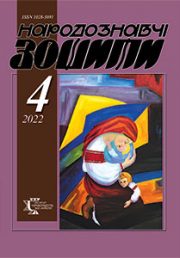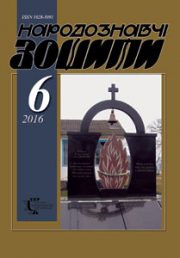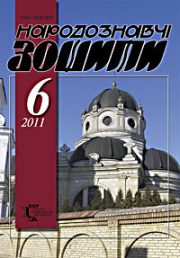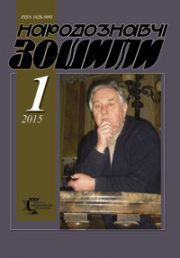The Ethnology Notebooks. 2018, № 4 (142), 825–831
UDK 94(44):20
DOI https://doi.org/10.15407/nz2018.04.825
Received 16.03.2018
THE GENESIS AND INTERPRETATION THE CONCEPT OF «RELIGION» IN SOCIAL AND HUMANITARIAN SCIENCES
Lutsiv Olena Yuriivna, laboratory assistant and Ph.D student of the department of social anthropology of the Institute of Ethnology of the National Academy of Sciences of Ukraine,
Svobody Avenue 15, 79000, Lviv, Ukraine
Contacts: Tel. (097)2556640; e–mail: olenka.lutsiv@gmail.com
Abstrakt. The article examines the evolution of the understanding of religion from antiquity to modern times. While in the antiquity the main views on religion were focused on the nature and the role of God, as well as the reasons for the existence of religious beliefs, Christianity offered new directions to the interpretation of religion and religious world view. First of all, the philosophical and theological views of participants of the I–IV Ecumenical Councils were united in a new doctrine – patristics. Exactly this doctirne, revealed the essence of God, faith and the function of religion in a completely new way. From the beginning of the New Age, the study and analysis of religion have become much more active. This is due to the scientific revolution that took place in the 16th–17th centuries. It was the time when G. Galilei created a new way of acquiring knowledge – scientific method before that time the interpretation of various concepts and views had been carried out through the prism of philosophy, which included various kinds of knowledge. Eventually, philosophical knowledge has dynamically overgrown into a scientific one, where division into a variety of scientific disciplines occured. Religion was studied by many of them (philosophy, anthropology, psychology, sociology of religion, etc.). Understanding of religion within the philosophical and scientific views also differs with methods and ways of cognition. First of all, scientific views explain the essence and the origin of religion through empirical studies of nature and society. Besides, science has developed an interdisciplinary approach where an explanation of any concept is possible in dealing with related disciplines. Nevertheless, religion can’t be perceived only by scientific method. Religion involves spiritual–sensory knowledge which expresses philosophical views. In addition, the article presents the author’s definition of “religion” concept which shows the unity between man and God through communication with him, veneration, and worshiping through the implementation of various religious practices.
Keywords: religion, religiosity, philosophy of religion, anthropology of religion, psychology of religion, sociology of religion.
REFERENCES
Sokolov, V.V. (Ed.). (1969). Antologija mirovoj filosofii (Vol. 1, part 1). Moskva: Mysl’ [in Russian].
Veber, M. (1994). Protestants’ka etyka i dukh kapitalizmu. Kyiv: Osnovy [in Ukrainian].
Gegel’, G.V., & Levina, M.I. (Per. s nem.). (1975). Filosofija religii (Vol. 1, pp. 16–275). Moskva: Mysl’ [in Russian].
Girc, K. (2004). Interpretacija kul’tur (pp. 88–124). Moskva: Rossijskaja politicheskaja jenciklopedija [in Russian].
Dakhnij, A.J. (2015). Narysy istorii zakhidnoi filosofii XIX–XX st.: navch. posibnyk (pp. 231–258). L’viv: LNU imeni Ivana Franka [in Ukrainian].
Diurkhajm, E. (2002). Pervisni formy relihijnoho zhyttia. Totemna systema v Avstralii. Kyiv: Yunivers [in Ukrainian].
Zimmel’, G. (2015). Izbrannoe. Problemy sociologii (pp. 83–112). Moskva; Sankt–Peterburg [in Russian].
Kulahina, H. (2009). Psykholohiia relihii iak dystsyplinarne utvorennia. Ukrains’ke relihiieznavstvo, 1, 85–100 [in Ukrainian].
Lobovyk, B. (1996). Relihiia iak fenomen i katehoriia relihiieznavstva. Ukrains’ke relihiieznavstvo, 4, 3–12 [in Ukrainian].
Gricanov, A.A., Abushenko, V.L., Evel’kin, G.M., & Sokolova, G.N. (2003). Sociologija. Jenicklopedija. Mn.: Knizhnyj dom [in Russian].
Konstantinov, F.V. (Ed.). (1967). Filosofskaja jenciklopedija. (Vol. 4, p. 53). Moskva: Nauka logiki – Sigeti [in Russian].
Frjezer, Dzh. (1988). Zolotaja vetv’: Issledovanie magii i religii. Moskva: AST [in Russian].
Fromm, E. (2010). Psihoanaliz i religija. Moskva: Ast [in Russian].
Popov, I., Muchennik. (2006). Konspekt lekcij po patrologii. Tver’: Bulat [in Russian].
Pals D.L. (2006). Eight theories of religion (2nd ed). USA: Oxford University Press.
Buber, M. Dva obraza very. Perevod s nemeckogo / pod redakciej P.S. Gurevicha, S.Ja. Levit, S.V. Lezova. Retrieved from: http://lib.ru/FILOSOF/BUBER/vera.txt (Last accessed: 15.01.2018).
Garadzha, V.I. Religija kak predmet sociologicheskogo analiza. Retrieved from: http://www.gumer.info/bogoslov_Buks/bogoslov/SocRelig/_Intro.php (Last accessed: 15.01.2018).
Kant, I. Religija v predelah tol’ko razuma. Retrieved from: http://www.gumer.info/bogoslov_Buks/Philos/kant/rel_ind.php (Last accessed: 15.01.2018).
Tajlor, J.B. Pervobytnaja kul’tura. Retrieved from: http://www.gumer.info/bibliotek_Buks/History/Tail/ (Last accessed: 15.01.2018).
Fejerbah, L. Sushhnost’ religii. Retrieved from: https://www.litmir.me/br/?b=71068 (Last accessed: 15.01.2018).
Frojd, Z. Psihicheskij genezis religioznyh predstavlenij. Retrieved from: http://www.gumer.info/bogoslov_Buks/bogoslov/SocRelig/_Intro.php (Last accessed: 19.03.2014).
Frojd Z. Totem i tabu. Retrieved from: http://www.gumer.info/bibliotek_Buks/Psihol/fr_tabu/ (Last accessed: 15.01.2018).







